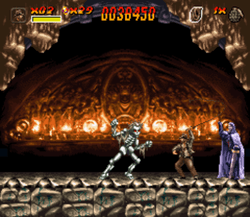Indiana Jones' Greatest Adventures
| Indiana Jones’ Greatest Adventures | |
|---|---|
 SNES Cover art | |
| Developer(s) |
Factor 5 LucasArts |
| Publisher(s) | JVC, LucasArts |
| Producer(s) | Julian Eggebrecht |
| Designer(s) |
Kalani Streicher Thomas Engel Julian Eggebrecht Willi Bäcker |
| Programmer(s) | Thomas Engel |
| Composer(s) | Rudolf Stember |
| Engine | Super Star Wars |
| Platform(s) | Super NES |
| Release date(s) |
|
| Genre(s) | Platform |
| Mode(s) | Single-player |
Indiana Jones’ Greatest Adventures is a 1994 platform video game released for the Super Nintendo Entertainment System. It is a video game adaptation of the Indiana Jones films Raiders of the Lost Ark (1981), Indiana Jones and the Temple of Doom (1984), and Indiana Jones and the Last Crusade (1989). The game was developed by Factor 5 and published by JVC Musical Industries, Inc. The story is told through cutscenes and text and is mostly faithful to the movies. Its release coincided with that of Super Star Wars: Return of the Jedi, also released by JVC and LucasArts and in the same platform style as the Super Star Wars trilogy.
A Sega Mega Drive/Genesis port of the game was apparently completed and ready to be released between summer and autumn of 1995, and was reviewed in GamePro (issue 83, August 1995, graphics rated 4.0 out of 5.0, sound and funfactor rated 3.5 out of 5.0, control rated 4.5 out of 5.0)[1] and in Germany's GAMERS (November 1995 issue, rated 2, or B Grade).[2][3] Like many third-party titles near the end of the Genesis' life, however, the game was shelved and was never released.
The game was re-released for the Wii's Virtual Console service on November 16, 2009 and in the PAL region on April 23, 2010.
Gameplay
The game is primarily action based, and the player controls Indiana Jones through levels based on events of the movies. Jones's main method of attack is his bull-whip, but he can also damage enemies by punching or rolling into them. Occasionally a gun can be found that has unlimited ammo, and grenades are available in limited numbers. Besides attacking, the whip can also be used as a method of swinging across pits. Once in a while, the game breaks the mold from the typical action and plunges the player into various other types of gameplay, such as flying a plane, riding a mine cart, and going down a mountain on a raft.

Indiana Jones’ Greatest Adventures uses the same engine as the Super Star Wars series[4] and is divided into 28 areas, many of them in side-scrolling view and others in driving stages. If Indy dies in an area, the player restarts from the beginning of the current area. All three of the movies are featured in the game, but Raiders of the Lost Ark is the only one playable upon starting the game. In order to play Temple of Doom and Last Crusade, the player must progress through the game or use a password.
Reception
On release, Famicom Tsūshin scored the game a 25 out of 40.[5] GamePro described it as a decent though unexceptional side-scroller. They cited the game's faithful recreation of the scenery and enemies of the films as its strongest point, but found that the graphics are inconsistent, the music is excellent but stays the same through most of the game, and the stages are far too easy.[6] The four reviewers of Electronic Gaming Monthly contradicted this, saying that the game is extremely challenging, with two of them adding that it suffers from frequent unavoidable hits. However, they praised the game's graphics, especially the Mode 7 effects, and gave it a score of 7 out of 10.[4]
See also
References
- ↑ "ProReview: Indiana Jones' Greatest Adventures". GamePro. IDG (83): 66. August 1995. Retrieved July 6, 2009.
- ↑ "GAMERS (Germany) review Part 1, November 1995 issue". Retrieved July 6, 2009.
- ↑ "GAMERS (Germany) review Part 2, November 1995 issue". Retrieved July 6, 2009.
- 1 2 "Review Crew: Indiana Jones". Electronic Gaming Monthly. Ziff Davis (66): 38. January 1995.
- ↑ NEW GAMES CROSS REVIEW: インディ・ジョーンズ. Weekly Famicom Tsūshin. No.346. Pg.30. 4 August 1995.
- ↑ "ProReview: Indiana Jones' Greatest Adventures". GamePro (64). IDG. November 1994. p. 120.